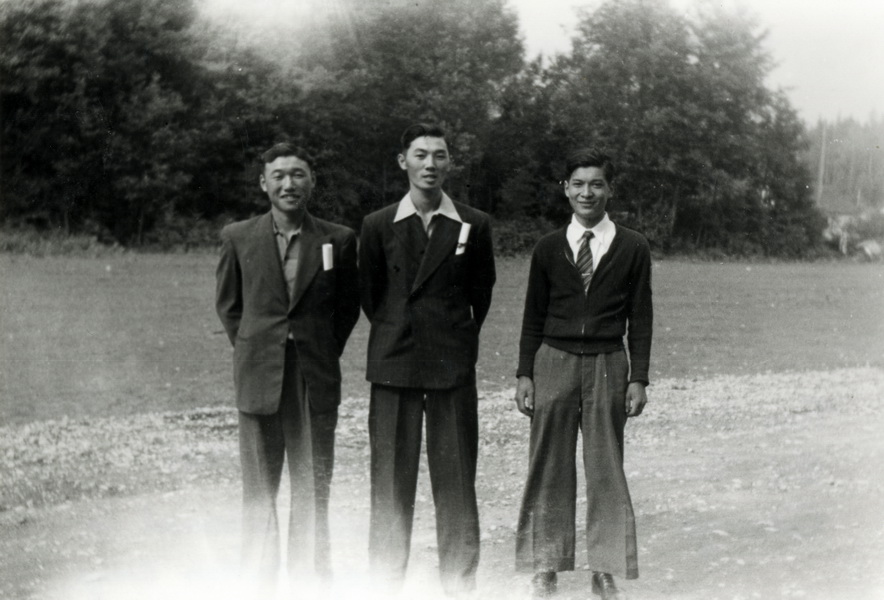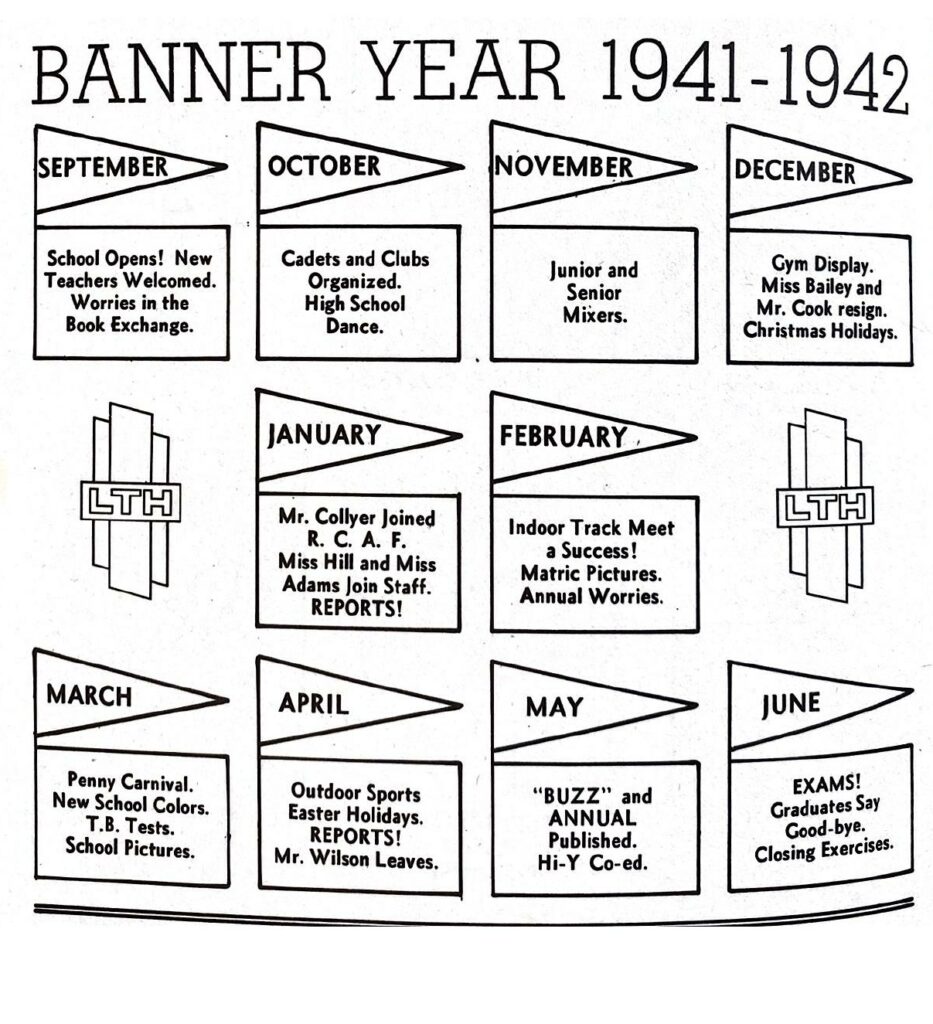

For many students and teachers, the removal of all Japanese students was incredibly upsetting. A Lord Tweedsmuir teacher recalled the event saying, “It was a very traumatic time. All the children in the school cried all day when they left. The Japanese pupils had to pack up and we all stood outside and said goodbye.” Despite the emotional goodbye there was no mention of the departure of Japanese students in the Lord Tweedsmuir yearbook, which listed all of the important events of the year.1
When discussing the communities’ feelings surrounding Japanese internment Joan Parolin explained that there was a division, with her and her peers who knew their Japanese classmates very well “just spluttering with rage about the unfairness of it.” She believed that the adults felt that the government was doing the right thing, partially due to the economic competition they felt with the Japanese Canadians who were talented fishers and farmers, along with the bonus of cheap properties becoming available. She kept in touch with some of her peers through letters; these letters between teenagers would sometimes be opened and marked “Examined by Censor.”2
One of her old classmates, Dr. Okamira, commented that if he remained in Surrey, he would have become a chicken farmer, but due to his removal he was able to improve his life and became a gynecologist. The removal improving career prospects seems to be a common theme among those that were removed. Others did not feel that being forced to leave the coast in their teenage years improved their life at all, such as Kenro Nagasaka, who commented that life had been a struggle for him, but that he did not want to use the war as an excuse for this.3
Following the war, few families returned to Surrey. Only one man in Surrey, the father of a Queen Elizabeth student, Zennosuke Inouye was able to get his land returned. Inouye was a veteran of the First World War and received his land back after writing eighty letters to government officials.4
Excerpts from Joan’s Letters
“Gee, Joan, I wish you were with me or I with you. It’s a shame war can endure in this civilized world, isn’t it? I hope we can meet all over again just once more in the near future.”
Mototsune, Sumi. Correspondence from Sumi Mototsune to Joan Gillis. 18 July 1943. RBSC-ARC-1786-02-15. Joan Gillis fonds. University of British Columbia Library Rare Books and Special Collections, Vancouver, Canada.
“Well, out here in Rainier, life’s getting duller and duller. We’ve finished work now, at last. We finished up thrashing about 4 days ago — right now we’re recuperating so that we can now have some fun.”
Ohama, Albert. Correspondence from Tad Nagamori to Joan Gillis. 14 November 1942. RBSC-ARC-1786-01-37. Joan Gillis fonds. University of British Columbia Library Rare Books and Special Collections, Vancouver, Canada.
“I do not know how to thank you for that swell pin. You do not know how I felt when I touched it and looked at for a long time. That pin alone brought back the memories that I have cherished for so long. It reminded me of Q.H.S. and of the students that were in it and are in it now. It brought me back to the time I shook hands with you on that last day at school. Gosh, but I wish I could live those years over again. I feel like a soldier away on a foreign shore fighting in battles, and thinking the peaceful hours spent before the tragic occurrence. Thank you an awful lot Joan, for the pin. I won’t forget it.”
Nakamura, Yoshio. Correspondence from Yoshio Nakamura to Joan Gillis. 26 July 1944. RBSC-ARC-1786-02-43. Joan Gillis fonds. University of British Columbia Library Rare Books and Special Collections, Vancouver, Canada.
“P.S. The radio is playing “I dream of you”. I do really, and of the rest of the old gang. Some day, even tho’ we be almost strangers, I will visit that way.”
Nakamura, Yoshio. Correspondence from Yoshio Nakamura to Joan Gillis. 19 September 1945. RBSC-ARC-1786-02-51. Joan Gillis fonds. University of British Columbia Library Rare Books and Special Collections, Vancouver, Canada.
“How did you celebrate V E Day? On Monday we had a holiday from the afternoon and on that night we had a thanksgiving service from 8:30 P.M. and after the service we had a bonfire (rotten railroad ties and salvaged rubbers) and after the bonfire we had a free dance at the Opera House. Oh yes, I forgot to tell you, we burned Hitler (dummy).”
Mototsune, Sumi. Correspondence from Sumi Mototsune to Joan Gillis. 5 June 1945. RBSC-ARC-1786. Joan Gillis fonds. University of British Columbia Library Rare Books and Special Collections, Vancouver, Canada.
“Talk about shool [sic]. I’m sick of school. Sick of going 3 miles to learn nothing. All I learnt so far is a little math and french. Hardly learnt anything in the other subjects. School is a little bit livelier now that they play badminton during noon hours. We are making a ping pong table in shop so we’ll be able to play ping pong soon. The tumbling club isn’t getting ahead very fast. Yesterday we had club period so I went down to tumble and I was doing these forward rolls and thing again. I don’t think I’ll go down to tumble again till they get a little better.”
Takahashi, Jackie. Correspondence from Jackie Takahashi to Joan Gillis. 22 January 1944. RBSC-ARC-1786-01-30. Joan Gillis fonds. University of British Columbia Library Rare Books and Special Collections, Vancouver, Canada.
Next Page → Victory Celebrations
- Lord Tweedsmuir High School, The Salute (Surrey, BC: 1942), Courtesy of the Lord Tweedsmuir Alumni Association.; Surrey High School Annuals, 1940-1986, F129, Courtesy of Surrey Archives, Surrey, BC, Canada. ↩︎
- Joan Parolin (nee Gillis) Interview, 8 Aug. 1990. SMA90.21.19. Surrey Museum and Archives Oral History Collection. Courtesy of Surrey Archives, Surrey, BC. Canada. ↩︎
- Joan Parolin (nee Gillis) Interview.; Surrey High School Annuals, 1940-1986, F129, Courtesy of Surrey Archives, Surrey, BC, Canada. ↩︎
- Jane K. Watt. Surrey: A City of Stories. (City of Surrey, Heritage Services, 2017)., 175-176. ↩︎